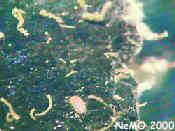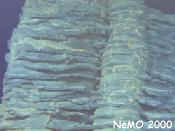| |
Teacher
Logbook:
Sunday, July 9, 2000 1500
hrs.
To some of the scientists,
living at sea for weeks at a time is old hat. Many of them have been to
out here dozens of times. After a brief adjustment period they're used
to the conditions that many landlubbers, such as myself, don't think about.
For instance, everything continually moves. Occasionally your stomach
feels like you're on a roller coaster ride, but usually the ship just
rocks gently with each passing swell. It's somewhat analogous to riding
in a car. It can lull you to sleep. When the waves are high it makes everything
tough out here. The biologists find taxonomic identification difficult
when their specimens in the petri dish are swashing back and forth under
the microscope.
Good weather is an extremely
important component to the success of an expedition such as this. ROPOS
is our only means of viewing and sampling from the world below, and its
use is somewhat weather limited. The ROPOS team starts biting their nails
when wind speeds exceed 25 knots, and for good reason. The 17,000 lb (7700kg)
van sized ROV is not something to take lightly when suspended in the air
on rough seas. Even with its powerful winch and several crew members working
to get it in and out of the water safely, it sways and things can go wrong.
To avoid a costly mistake, weather forecasts are continually checked and
assessed for conditions conducive to deploying and retrieving the vehicle.
Without cooperation from Mother Nature, it stays on deck.
Loosing dive time doesn't
make anyone out here happy because it's very expensive to run a large
expedition such as this. Every moment counts. To maximize dive time people
work in shifts around the clock. This includes the ROPOS team who maintains
and operates the vehicle, scientists who instruct the ROPOS pilot on dive
logistics, and supporting scientists who operate the navigation system,
dive logs, and video taping necessary for a successful dive. The control
room is quite an operation, day and night. We've been extremely lucky
on this cruise so far because of the relatively consistent weak high-pressure
air mass hanging over us. It brings overcast skies, but relatively low
wind speeds. Hope it keeps up because I wouldn't want to spill one of
my last cups of coffee.
Jeff
|
|

Amphisamytha galapagensis
(worms that live in white tubes), red scale worms (Polynoid), and tube
worms in the background - all on a piece of basalt.

Lava pillar with bathtub
rings at Magnesia Vent.
|
|

